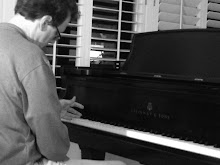Sonata No. 1 Maestoso
A new movement for my sonata. This is an early draft. As I learn to play the piece, like the Allegro from Sonata No. 1, it will certainly evolve.
If the Allegro explores a metrical interpretation of Sonata form, so too does the Maestoso. The Allegro explores the relationship of 6:7, with 6 perhaps identified symbolically with a 'tonic' and 7 a 'dominant', developed through sonata form. In the Maestoso, the form is theme and variations, except the theme derives metrical 3:4. Consider the simple opening of the piece:

From the opening, the listener is presented with two sources of ambiguity. While in 3/4, the piece suggests 3 yet by the third measure proposes 4. A second source of ambiguity stems from the neighbor tones, C# and D. Do we 'tonicize' the 'D' by treating the C# as a leading tone (the key signature suggests as much), or instead do we have a Phrygian motion from D to 'C#? In fact, there seems to be a symmetrical relationship between two.
Similarly, the following table outlines the structure of the two voices found in the first variation on this 'theme' (mm. 10-28). The rows give tonal field, its key, and the metrical units of each gesture.

Etc.
Draft Score of Sonata No. 1: Maestoso
Sibelius Generated MP3
If the Allegro explores a metrical interpretation of Sonata form, so too does the Maestoso. The Allegro explores the relationship of 6:7, with 6 perhaps identified symbolically with a 'tonic' and 7 a 'dominant', developed through sonata form. In the Maestoso, the form is theme and variations, except the theme derives metrical 3:4. Consider the simple opening of the piece:

From the opening, the listener is presented with two sources of ambiguity. While in 3/4, the piece suggests 3 yet by the third measure proposes 4. A second source of ambiguity stems from the neighbor tones, C# and D. Do we 'tonicize' the 'D' by treating the C# as a leading tone (the key signature suggests as much), or instead do we have a Phrygian motion from D to 'C#? In fact, there seems to be a symmetrical relationship between two.
Similarly, the following table outlines the structure of the two voices found in the first variation on this 'theme' (mm. 10-28). The rows give tonal field, its key, and the metrical units of each gesture.

Etc.
Draft Score of Sonata No. 1: Maestoso
Sibelius Generated MP3

